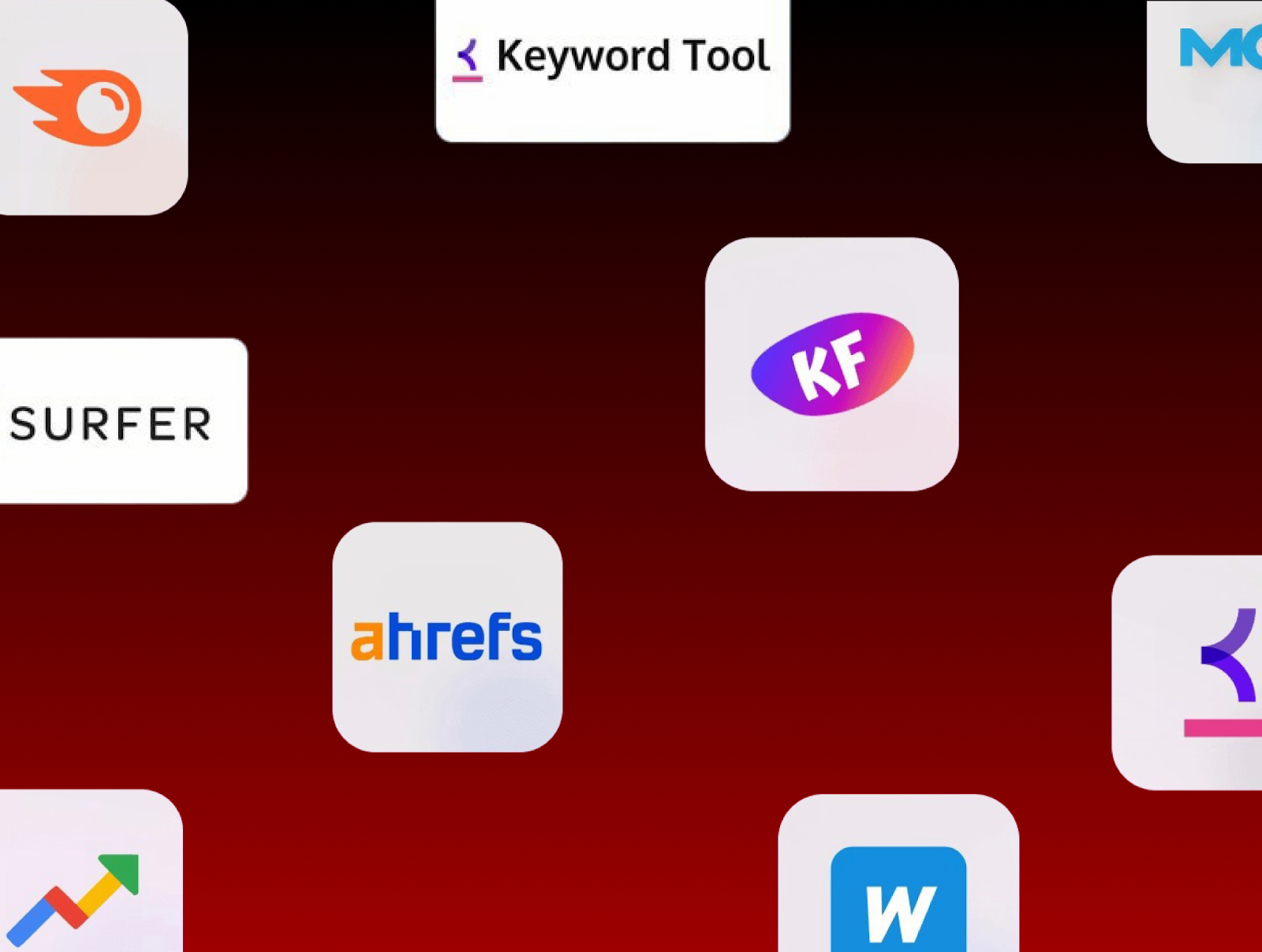Top 10 Best Free SEO Keyword Research Tools in 2025 [Updated]
Every digital strategy starts with strong data, and in 2025, SEO keyword research tools remain essential for SEO managers and digital marketers looking to build steady search visibility. These tools help identify search demand, reveal competitor strategies, and guide content plans that drive sustainable traffic and measurable ROI. With free options now offering robust features—from AI-driven keyword analysis to intent classification—you can refine your approach without heavy upfront costs.
This post reviews the best SEO keyword research tools available for free, covering a range of needs from quick insights to in-depth cluster analysis. You'll find a curated list, each tool explained with its strengths, direct links, and tips for optimal use. Expect clear recommendations, SEO-friendly images, and tool logos. You'll also find select links to trusted ClickBox guides, like the top technical SEO tools, to boost your toolkit even further.
Why Free Keyword Research Tools Matter for SEO Success

Free SEO keyword research tools offer far more than basic utility—these platforms democratize access to crucial search data. For strategic SEO managers and marketers, they provide an immediate way to analyze keyword ideas, understand how audiences look for solutions, and quickly adjust plans based on shifting demand. In a landscape where agility and data-driven decisions are essential, free tools allow even small teams to compete at scale.
Accessibility Drives Smarter Decisions

No-cost keyword research tools remove the barrier of expensive subscriptions. This is especially important for:
-
● Startups testing new markets.
-
● Small teams with limited SEO budgets.
-
● Agencies validating early-stage concepts before making larger investments.
By offering instant access to data, these tools make it possible to spot trends and measure demand for new topics before any major spend. Anyone—from a freelancer to a global agency—can start optimizing and testing content ideas in real time.
Expanding Experimentation Without Risk
Keyword research is not a one-time job. Free tools help users:
-
● Compare dozens of keyword ideas quickly.
-
● Uncover long-tail phrases for niche audiences.
-
● Test hypotheses, such as which intent or topic resonates most.
Open access means more trial and error, which leads to smarter, more resilient strategies. Teams can adapt because there is no cost penalty for exploring new search trends or evaluating keyword relevance over time.
Empowering Informed Content Planning
Reliable keyword data drives editorial decisions that match user needs. With free SEO keyword research tools, you can:
-
● Map out keyword clusters for website sections.
-
● Find gaps in your content where competitors already rank.
-
● Define which topics can realistically be ranked for, saving time and resources.
This focused research supports the creation of content that doesn’t just generate clicks but solves problems and builds authority. Explore how different keyword styles—such as informational versus transactional—shape campaign strategy in this overview of Different Types of Keywords in Digital Marketing.
Supporting Scalable SEO for Small Teams
In many organizations, SEO is just one responsibility among many. Free tools enable lean SEO teams and solo professionals to:
-
● Research industry trends without waiting for software purchases.
-
● Present data-backed recommendations to management.
-
● Prove ROI by showing early performance wins tied to keyword strategy.
The right free tools streamline workflows, reduce the learning curve, and encourage experimentation that is essential for growth-minded teams.
Typical Use Cases for Free Tools
For both beginners and advanced professionals, using these free tools can support a range of outcomes:
-
● Developing a blog editorial calendar based on seasonal keyword spikes.
-
● Identifying new local search opportunities for regional clients.
-
● Researching keyword cannibalization or duplication within a large site.
-
● Supporting outreach for small businesses, such as Clickbox Agency Services in Coimbatore, by defining precise target terms.
When you use high-quality, free SEO keyword research tools, you open a path to repeatable, data-informed success—regardless of your team’s size or your budget. For a broader look at related enhancements for your toolkit, review resources on the Top Chrome SEO Extensions for 2025.
For an in-depth understanding of why keyword research still underpins effective SEO, see the foundational guide on SEO keyword research: What it is and why it's important.
Comprehensive Review: Top 10 Best Free SEO Keyword Research Tools for 2025
Finding the right keywords is the backbone of modern SEO campaigns. For SEO managers and digital marketing leaders, free keyword research tools bring high-value insights without the costs of enterprise platforms. The 2025 market features a mix of tried-and-true platforms and newer solutions tailored for fast, data-driven results. Explore these top picks to expand your arsenal of seo keyword research tools, align to trends, and prioritize informed decision-making in your content planning.
1. Google Keyword Planner: Trusted Data, Accurate Volumes
Google Keyword Planner remains a staple for both PPC and SEO professionals. Its greatest strength is the accuracy of its search volume data since it draws directly from Google’s database. For those focusing on free SEO, this means you can spot emerging topics—or monitor established keywords—using the same metrics used by advertisers.
-
Key Features:
-
● Reliable monthly search volume estimates.
-
● Wide range of keyword suggestions, including broad and long-tail terms.
-
● Closely integrated with Google Ads, but fully usable for SEO research.
-
-
Pros:
-
● Data straight from Google, eliminating guesswork.
-
● Granular location targeting and historical data.
-
● Useful for both campaign planning and content optimization.
-
-
Cons:
-
● Requires a Google Ads account to get started.
-
● Lacks in-depth competitor or SERP analysis.
-
-
Best For:
-
● Users who require trusted search volume data for both paid and organic keyword planning.
-
For step-by-step guidance, see how top marketers rely on Google Keyword Planner for SEO in 2025.
2. Ubersuggest: User-Friendly and Full of Essentials
Ubersuggest stands out for its ease of use, making it popular with beginners and experienced marketers who want fast results. The tool offers simple keyword suggestions, SEO difficulty levels, competitive data, and website audits—all within a clean, guided interface.
-
Key Features:
-
● Keyword volume, CPC, and competition analysis.
-
● Difficulty scoring to prioritize efforts.
-
● Intuitive dashboard and helpful visualization.
-
-
Pros:
-
● Beginner-friendly, with clear metric displays.
-
● Offers valuable technical SEO insights for site improvement.
-
-
Cons:
-
● Limited daily searches on the free plan.
-
● Deep features are locked to paid versions.
-
-
Best For:
-
● Beginners or small teams looking for a one-stop SEO dashboard and quick keyword research.
-
For a practical overview, check out the Ubersuggest Free Keyword Research Tool. Add a screenshot of the results page for greater clarity.
3. Keyword Surfer: Chrome Extension for SERP Insights
Keyword Surfer is a Chrome extension that reveals instant keyword data as you search on Google. Users see estimated search volumes, keyword ideas, and on-page data right inside SERP pages—making fast research simple.

-
Key Features:
-
● Real-time keyword volume, similarity, and traffic metrics directly in search results.
-
● Generates keyword suggestions based on your query.
-
● No separate dashboard—everything happens within Google.
-
-
Pros:
-
● Speeds up workflow for on-the-fly research.
-
● 100% free and lightweight.
-
-
Cons:
-
● Data scope is limited compared to full platforms.
-
● Chrome-only; not available for Firefox or Safari.
-
-
Best For:
-
● Marketers who want instant keyword context and volume data without leaving SERPs. Recommend adding the Chrome logo to highlight its extension format.
-
Get it on the Keyword Surfer - Chrome Web Store.
4. Answer the Public: Visualize Questions and Content Ideas
.png)
Answer the Public scans auto-suggest data to create visual maps of real user questions and topics. Its unique approach—data delivered as interactive diagrams—makes it a favorite for creative brainstorming and wider topic exploration.
-
Key Features:
-
● Visualizes keyword and question clusters around your seed keyword.
-
● Grouped by question type, prepositions, and comparisons.
-
● Instant export for team collaboration.
-
-
Pros:
-
● Converts raw search data into intuitive visual maps.
-
● Excellent for uncovering long-tail and question-based keywords.
-
-
Cons:
-
● Usage limited on the free plan.
-
● No deep SERP or competitor metrics.
-
-
Best For:
-
● Brainstorming new blog topics, FAQs, or understanding customer language at a glance.
-
Access the tool directly at AnswerThePublic: Search listening tool.
For deeper content coverage, consider matching these insights to your technical SEO strategy. Browse our technical SEO tools guide.
5. Moz Keyword Explorer: Robust Metrics and Trend Spotting
Moz Keyword Explorer is valued by professionals for its detailed metrics and clear scoring system. The platform highlights topics and groups related keywords, making it ideal for marketers tracking new trends or refining content themes.
-
Key Features:
-
● Keyword opportunity, difficulty, and potential score.
-
● Topic grouping and competitor SERP analysis.
-
● Data-rich dashboard with export options.
-
-
Pros:
-
● Deep keyword analysis for nuanced planning.
-
● Known for accuracy and trusted scoring.
-
-
Cons:
-
● Free usage is capped monthly.
-
● Some advanced reports require a paid plan.
-
-
Best For:
-
● Marketers wanting comprehensive, trend-focused reports and actionable keyword clusters.
-
Get an in-depth look at features in this Moz Review (2025) — Features, Pricing and Key Pros and Cons. Try the Free Keyword Research Tool.
6. Keyword Tool.io: Long-Tail and Multi-Platform Focus
Keyword Tool.io pulls keyword suggestions from Google Autocomplete and other platforms like YouTube, Bing, Amazon, and more—perfect for scaling content across several channels. It excels in generating long-tail keyword lists, offering exportable data for robust planning.
-
Key Features:
-
● Generates hundreds of auto-complete keyword ideas.
-
● Supports multiple search engines and marketplaces.
-
● Exports to CSV for fast sharing and use.
-
-
Pros:
-
● Large volume of long-tail keyword ideas.
-
● Great for YouTube, eCommerce, and multi-platform marketers.
-
-
Cons:
-
● Full search volume and trend data is paid-only.
-
● Repetitive suggestions if not filtered.
-
-
Best For:
-
● Planning content for blogs, video, and niche search channels.
-
Try it yourself at Keyword Tool.
For those focused on content expansion or technical audits, review our SEO tips on top SEO Chrome extensions 2025.
7. Soovle: Idea Generation Across Search Engines
Soovle aggregates keyword suggestions in real time across engines like Google, Bing, Yahoo, YouTube, and Amazon. Its simple interface encourages rapid scanning for diverse idea generation—ideal at project kick-off.
-
Key Features:
-
● Multi-engine keyword suggestions in one view.
-
● Live filtering and export options.
-
● No sign-up required to use.
-
-
Pros:
-
● Instant brain dump for broad or niche topics.
-
● Helps see differences in user intent across industries or platforms.
-
-
Cons:
-
● Lacks deep analytics or advanced metrics.
-
● Visual design is basic.
-
-
Best For:
-
● Brainstorming new content directions or discovering keyword intent differences across networks.
-
Learn more at Soovle | Generate keyword ideas from multiple search engines.
8. Keyword Sheeter: Bulk Output, Blazing Fast
Keyword Sheeter is built for scale—it streams thousands of keyword suggestions based on your initial input, making it perfect for building large seed lists fast. It’s known for speed and easy data export.
-
Key Features:
-
● Generates hundreds to thousands of keyword ideas rapidly.
-
● Bulk export to CSV or spreadsheet.
-
● Free, core features without sign-up.
-
-
Pros:
-
● Delivers sheer volume for supporting large projects.
-
● Allows filtering by negative or positive keywords.
-
-
Cons:
-
● No metrics included (volume, competition, difficulty).
-
● Lacks advanced analysis features.
-
-
Best For:
-
● High-speed brainstorming, especially when quantity matters more than precision.
-
Try the tool described in this review: Keyword Sheeter – Bulk Keyword Idea Generator.
9. Google Trends: Insight on Seasonality and Trends
Google Trends helps users visualize how keyword popularity spikes and wanes over time—a must for planning seasonal campaigns and staying ahead of shifts. Graphs show regional interest and related queries at a glance.
-
Key Features:
-
● Visual trend graphs for keyword search interest.
-
● Comparison of multiple topics and timeframes.
-
● Geographic and topic-based filters.
-
-
Pros:
-
● Free, unlimited use of robust, real-time trends.
-
● Useful for pitch decks or competitive research.
-
-
Cons:
-
● No granular search volume numbers.
-
● Works best alongside other tools for comprehensive research.
-
-
Best For:
-
● Marketers planning seasonal promotions, tracking trends, or validating topic momentum. Adding a trends graph or Google logo illustrates its reporting style.
-
See trends now: Google Trends.
10. QuestionDB: Content and FAQ Opportunity Finder
QuestionDB scours forums and Q&A sites to deliver question-based keyword ideas. This tool shines for those developing FAQ content, blog outlines, or semantic SEO targeting natural language search.
-
Key Features:
-
● Focuses solely on user questions and queries.
-
● Simple export and topic organization.
-
● No sign-up required to access core features.
-
-
Pros:
-
● Exposes gaps and content opportunities others miss.
-
● Perfect for people-first, intent-based SEO.
-
-
Cons:
-
● Limited metrics beyond the questions themselves.
-
● Fewer broad keyword suggestions.
-
-
Best For:
-
● Creating new FAQ pages, expanding content with authentic questions, and semantic content planning.
-
Get started and review expert advice at 5 Best Keyword Research Tools in 2025 [Expert Reviewed].
By incorporating a mix of these free SEO keyword research tools into your standard process, you equip your team to address everything from technical SEO to content expansion—often without any upfront investment. If you want to strengthen your technical knowledge even further, check out our technical SEO tools guide.
How to Choose the Right Free Keyword Research Tool: Criteria for 2025

Selecting the best free SEO keyword research tools isn’t just about picking what’s popular. As search patterns and algorithms change, your tool must deliver reliable, fresh insights that fit your specific needs. With more options on the market, you need a simple roadmap for evaluating tools before investing your time or effort.
The right selection process helps you sidestep common mistakes like relying on stale data, overlooking niche opportunities, or using clunky interfaces that slow your workflow. Below are the most important criteria to consider as you choose your primary keyword tool for 2025.
1. Data Freshness and Volume Accuracy
A top concern for digital marketers is whether the keyword data is current and aligned with real search trends. Outdated search volumes or suggestion lists waste time and lead to missed strategic bets. Look for tools that show updated monthly volumes and adapt to search shifts. For more on how to select keywords that drive meaningful results, see this detailed guide on how to choose the best keywords for SEO.
-
● Check update frequency: Monthly or even weekly updates indicate the tool maintains relevance.
-
● Source transparency: Prefer tools that pull from recognized data sources, such as Google or Bing, instead of closed pools.
-
● Trust volume data: Be wary of tools that offer high-level estimates with no citation or sample size details.
2. User Interface and Ease of Use

A clear, uncluttered interface speeds up research—especially for managers juggling many tasks. Choose keyword research tools that present key metrics like difficulty scores, search intent, and related terms visually and accessibly.
-
● Simple navigation saves time for repeat projects.
-
● Short learning curve: Managers and team members should start using the tool with minimal training.
-
● Helpful visuals: Trends graphs, word clouds, and cluster exports support quick analysis.
3. Exportability and Workflow Integration
Smooth data export options keep your keyword research useful across your SEO stack. In 2025, integration with spreadsheets, project management systems, or content calendars is standard for high-performing teams.
-
● Flexible exports: CSV, XLSX, or Google Sheet formats promote collaboration.
-
● API access: Advanced users might need direct API connections for automated workflows.
-
● One-click exports: Immediate extraction removes friction from brainstorming to execution.
4. Suitability for Niche and Broad Campaigns
Some tools excel at short, high-volume keywords, while others uncover valuable long-tail, intent-based phrases. Target the option that matches your growth market—B2B, local, eCommerce, or informational.
-
● Check database breadth: Multi-platform tools pull from diverse sources (Google, YouTube, Amazon), expanding reach.
-
● Intent detection: Tools that segment by search intent can help focus campaigns on high-converting terms.
If you’re working in a narrow sector or unique industry, prioritize tools with filters for region, device, or content type.
5. Accuracy in Keyword Metrics
Numbers like keyword difficulty, SERP competition, and click-through rates directly impact your campaign ROI. Free tools vary greatly in how they calculate—or even if they provide—these figures.
-
● Difficulty and opportunity scoring: Gives you a risk assessment on new keyword targets.
-
● SERP and competitor analysis: Some tools include rich SERP previews or compare domain-level ranking potential.
-
● Click potential: CPC estimates or CTR probabilities deepen your understanding of real-world value.
6. Depth of Keyword Suggestions
A packed suggestion list reveals more content gaps and topic clusters for your site. Choose tools that offer a range of keyword types, from head terms to long-tail and question-based options.
-
● Cluster grouping: Advanced tools bundle ideas in topical clusters for easier content planning.
-
● Question and comparison suggestions: These tap into user intent, supporting people-first SEO strategies.
If you’re new to the range of keyword styles, refer to this overview of different types of keywords in marketing for context.
7. Historical and Trend Data Access
Understanding shifts in search demand is a competitive advantage—especially for seasonal campaigns. Tools that provide trend graphs or historical comparison tables equip you to predict volume spikes or wanes.
-
● Time-series views: Spot annual or monthly seasonality for smarter editorial playbooks.
-
● Regional trend segmentation: Local search planners can fine-tune efforts with city or country-based data.
For a deep exploration of seasonality features, review trusted overviews like The Ultimate SEO Keyword Research Guide in 2025.
8. Addressing Typical Challenges and Their Solutions
You may struggle with keyword cannibalization, data overload, or choosing between tools with similar features. Here are simple ways to address these issues:
-
● Too many features: Focus on the few core metrics that matter for your business objectives.
-
● Overlapping suggestions: Use negative keyword filters or intent classifiers to weed out duplicates.
-
● Difficulty cross-checking: Use multiple tools and validate with Google Search Console or Analytics.
For an advanced skillset in evaluating SEO data and keyword research methods, scan through Essential SEO Interview Questions to solidify your technical reasoning.
Choosing the right SEO keyword research tools comes down to knowing what data matters for your team and campaign goals. Clear criteria help you sift through competing options so you can act with confidence and speed. If you want to explore top free tools that fit this list, reference the roundup at The 4 best free keyword research tools for a broader perspective.
Leveraging Free Keyword Research Tools with ClickBox Agency’s Services
In 2025, the combination of the right free SEO keyword research tools and focused agency support can transform how any business tackles search optimization. Free tools make detailed data available on demand and help teams spot search trends quickly. However, these tools reach full strength when paired with expert insights that turn keywords into strategy, higher rankings, and real results. This is where a partner like ClickBox Agency can make the difference—helping you scale efforts with precision, context, and hands-on guidance.

Connecting DIY Research Tools to Professional Growth
Free SEO keyword research tools, such as those reviewed in this guide, help with:
-
● Quick keyword discovery for fresh content ideas.
-
● Basic volume, trend, and difficulty insight to guide campaigns.
-
● Identifying untapped long-tail phrases or new market segments.
But alone, these tools only provide surface-level data. Even with robust platforms like Google Keyword Planner and Moz Keyword Explorer, making data actionable—and shaping it into a ranked, optimized presence—calls for deeper experience. That’s where SEO consulting, technical audits, and optimization from ClickBox Agency enter the picture.
How ClickBox Agency Enhances Free Keyword Tool Value

ClickBox Agency helps bridge the space between free tool access and sustained SEO performance. Here’s how our process adds value to every stage of your keyword workflow:
-
● Custom Keyword Blueprints We audit your current site, map your industry’s keyword landscape, and align each keyword to business objectives and audience demand.
-
● Technical SEO Inspections Using advanced and predictive keyword analysis, our team uncovers missed opportunities and structural issues that free tools often overlook. For actionable strategies, review our expertise in technical SEO techniques.
-
● Optimization and Execution We turn research into action—mapping keywords to pages, building intent-driven clusters, and prioritizing topics that offer the highest ranking potential.
-
● Continuous Monitoring Regular tracking means your SEO plan evolves with the search environment. This monthly monitoring is key for acting on emerging search shifts.
Maximizing Your Toolkit: From Free Data to Result-Driven Strategy
When you integrate ClickBox’s services with the right free SEO keyword research tools, your workflow gains depth and direction:
-
● Greater accuracy: Manual validation filters out keyword distractions found in many free datasets.
-
● Strategic focus: Agency review prevents over-optimization or the pursuit of non-converting phrases.
-
● Scalable execution: Roadmaps guide your team from research to content creation to on-page wins.
-
● Agile response: Stay ahead of competitors with both tactical keyword pivots and technical enhancements.
For results beyond what standard free tools provide, consider a service partnership. Our ClickBox Agency Package Services support all levels, from startups to enterprise.
Combining Insights for Higher Rankings
Pairing free keyword research tools with agency-led strategy unlocks top-tier outcomes, including:
-
● Advanced mapping of semantic keyword groups for better topic coverage. For more, explore our guide on Semantic SEO strategies.
-
● Stronger technical health with audit-driven improvements.
-
● Aligned campaigns targeting both broad visibility and niche authority.
Agency intelligence transforms basic tool reports into actionable roadmaps for higher search positioning. For a step-by-step breakdown, see our proven SEO Strategies for Higher Google Rankings.
With this hybrid approach, marketers and SEO managers can move beyond guesswork and build campaigns that drive measurable results, no matter the market shifts or algorithm updates.
Conclusion
Free SEO keyword research tools now deliver robust features to marketers and SEO managers at any stage. Using tools like Google Keyword Planner, Answer the Public, and Moz Keyword Explorer, teams can discover valuable search terms, map content to real audience needs, and test new topics—all without financial barriers. These solutions are especially useful for building campaigns, refining local SEO, and tracking new trends, making them practical for both agile teams and established brands.
To get the best results, combine insights from these tools with professional guidance and a documented workflow. As your campaigns scale, resources like Local SEO packages or in-depth technical articles from the ClickBox blog can further boost your strategy and ranking efforts.
Activate your research now—test out the recommended tools, review your latest campaigns, and dive into the latest SEO strategies and tips from ClickBox to drive continuous growth. Thank you for reading—share your results or questions to keep the conversation going.
John Click
Digital Marketer | SEO Copywriter | Content Strategist
Experienced digital marketer with a proven track record in creating compelling content that not only engages audiences but also drives conversions and enhances SEO visibility. My expertise extends beyond marketing strategy to crafting persuasive narratives that resonate with your target audience. I combine data-driven strategies with captivating writing to deliver measurable results, ensuring your brand shines in the digital landscape.
John Click
Digital Marketer | SEO Copywriter | Content Strategist
Experienced digital marketer with a proven track record in creating compelling content that not only engages audiences but also drives conversions and enhances SEO visibility. My expertise extends beyond marketing strategy to crafting persuasive narratives that resonate with your target audience. I combine data-driven strategies with captivating writing to deliver measurable results, ensuring your brand shines in the digital landscape.




 Digital Marketing
Digital Marketing


 Digital Marketing
Digital Marketing Digital Marketing
Digital Marketing



